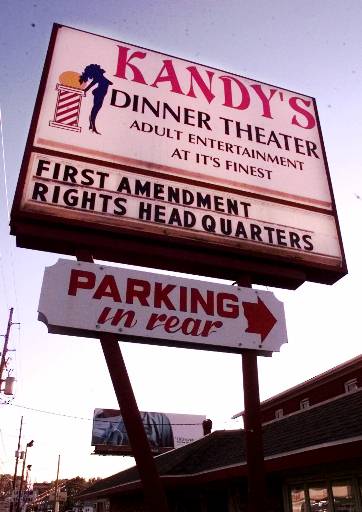In City of Erie v. Pap’s A.M, 529 U.S. 277 (2000), the Supreme Court ruled that Erie, Pennsylvania, did not violate the First Amendment free speech rights of nude dancers when the city council enacted an ordinance banning public nudity.
The decision followed the Court’s earlier decision in Barnes v. Glen Theatre, Inc. (1991) allowing government officials to prohibit totally nude dancing.
Erie ordinance outlawed nude dancing
Pap’s A.M. operated Kandyland, a nude dancing establishment. Kandyland had filed a complaint arguing that to comply with the 1994 Erie ordinance its previously nude dancers would now be required to wear pasties and G-strings in violation of the nude dancers’ First Amendment right to engage in expressive conduct, or free speech. The Court of Common Pleas of Erie County and the Pennsylvania Supreme Court found in favor of Kandyland. Erie appealed to the Supreme Court.
Nudity falls “only within the outer ambit of the First Amendment’s protection”
Relying on United States v. O’Brien (1968) and Glen Theatre, the Court upheld the ordinance by a 6-3 vote. Announcing the judgment of the Court and writing for a plurality, Justice Sandra Day O’Connor determined that Erie’s ban was permissible because it was not related to the suppression of nude dancing per se but rather public nudity in general. The plurality held Glen Theatre, in which a fractured Court found that Indiana’s public nudity ban did not violate the First Amendment, to be controlling.
Agreeing that being nude is expressive conduct, the plurality noted that it “falls only within the outer ambit of the First Amendment’s protection.”
Court found regulation of secondary effects of public nudity was acceptable
As in O’Brien and Glen Theatre, however, Erie’s intent was not to suppress a particular message but rather an attempt to regulate the negative secondary effects of the speech.
Just as the O’Brien Court found the ban on burning draft cards was related to maintaining the integrity of the selective service system and not restraining anti-war speech, the plurality determined that Erie’s intent was to negate the negative impact of nude dancing on public health and safety.
Justice Antonin Scalia’s concurrence, which Clarence Thomas joined, maintained that the secondary negative effects analysis was unwarranted because Erie could have banned public nudity simply to advance good morals.
Secondary use effects concerned dissenters
The secondary effects test employed by the plurality particularly concerned the three dissenters. Justice John Paul Stevens, joined by Ruth Bader Ginsburg, noted that the secondary effects test had traditionally been employed in relation to the location of erotic speech, not to substantiate an outright ban on protected First Amendment speech.
The consequences of this decision would be severe, Justice Stevens warned, since for the first time the Court declared that unwanted or unpopular speech could be prohibited simply due to effects that “happen to be associated” with that speech.
Though agreeing with the secondary effects test, Justice David H. Souter dissented on the application of the test, reasoning that because no evidentiary record demonstrating real negative harms flowing from nude dancing existed, the Court should remand the case to allow Erie to establish the empirical connection between public nudity and negative secondary effects.
In Glen Theatre, Souter had relied, ironically, on the secondary effects doctrine to uphold Indiana’s public indecency law.
This article was originally published in 2009. Kyle L. Kreider is a Professor of Political Science at Wilkes University, where he teaches the Constitutional Law classes. His most recent book is Voting Rights in America: A Reference Handbook, co-authored with Richard A. Glenn (ABC-CLIO, 2020).

